| Listing 1 - 10 of 14 | << page >> |
Sort by
|
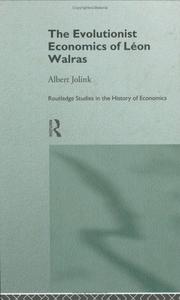
ISBN: 0415098246 0415756308 1134961707 1280115599 0203979524 9780203979525 9786610115594 6610115591 9780415098243 9781134961702 9781280115592 9781134961658 9781134961696 9780415756303 Year: 1996 Publisher: London ; New York : Routledge,
Abstract | Keywords | Export | Availability | Bookmark
 Loading...
Loading...Choose an application
- Reference Manager
- EndNote
- RefWorks (Direct export to RefWorks)
This study offers a new perspective of Walras' pure, applied and social economics. Through archival research at the University of Lausanne, Jolink considers Walras' ideas on philosophy and philosophy of science based on a newly constructed taxonomy. Walras' work is placed in a broader context by stressing the nineteenth century cultural and historical background in which he lived. This further gives an insight into the relationship between the romanticism of the early nineteenth century and logical positivism of the twentieth century.
Walras, Léon --- Evolutionary economics. --- Walras, Léon, --- Walras, Marie Esprit Léon, --- Economics
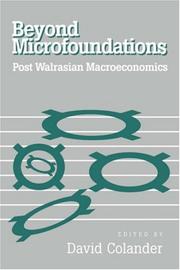
ISBN: 0521552370 0521034582 1139174622 9780521552370 9781139174626 Year: 1996 Publisher: Cambridge : Cambridge University Press,
Abstract | Keywords | Export | Availability | Bookmark
 Loading...
Loading...Choose an application
- Reference Manager
- EndNote
- RefWorks (Direct export to RefWorks)
Beyond Microfoundations discusses the foundations for a post-Walrasian macroeconomics and, in doing so, carries the work of Robert Clower and Axel Leijonhufvud to the present. This book spells out both why an alternative approach to macro is needed, and what the essence of the approach will be. This post-Walrasian approach to macro is neither Keynesian nor Classical, both of which have Walrasian foundations, but it offers an approach to macro in which Walrasian economics is turned on its head. Specifically, it rejects the Walrasian ad hoc assumptions of the existence of a unique equilibrium and of simple dynamics. That rejection leads one to a fundamentally different conception of macro than most macroeconomics have implicit in their formal model. Post-Walrasian macroeconomics offers a vision of macro in which micro foundations devoid of an explicit macro context have no place, but one in which institutions have a fundamental role. Post-Walrasian macroeconomics provides a foundation for an alternative macroeconomics for the twenty-first century built on the edges of chaos.
Macroeconomics --- Walras, Léon --- Macroeconomics. --- Microeconomics. --- Economics, Mathematical. --- Walras, Leon, --- Walras, Léon, --- Business, Economy and Management --- Economics --- Walras, Léon, - 1834-1910. --- Walras, Léon, --- Mathematical economics --- Econometrics --- Mathematics --- Price theory --- Methodology --- Walras, Marie Esprit Léon,
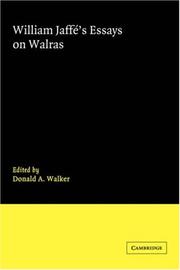
ISBN: 0521251427 0521034329 0511664516 9780521251426 Year: 1983 Publisher: Cambridge : Cambridge University Press,
Abstract | Keywords | Export | Availability | Bookmark
 Loading...
Loading...Choose an application
- Reference Manager
- EndNote
- RefWorks (Direct export to RefWorks)
In this book Dr Walker brings together Dr William Jaffé's essays on the important and interesting work of Léon Walras, the founder of general equilibrium analysis. The essays were selected on the basis of their importance to the Walrasian literature, in that they provide information on Walras's intellectual biography with which we would otherwise be unfamiliar or they make a contribution to the interpretation and analysis of his ideas. One of Jaffé's main interests was to explain the genesis of Walras's work, which he did by examining Walras's biography. Using a wide variety of sources, Jaffé pieced together an account of these matters in the belief that biography is essential for understanding the origins and development of a scientist's work. Jaffé corrected what he regarded as errors of interpretation of Walras by other writers, evaluated Walras's contributions, and indicated his significance for modern economics. The essays are informative, illuminating, and - as a result of Jaffé's scholarly and literary craftsmanship - aesthetically satisfying.
Walras, Léon --- Economists --- Biography --- Walras, Leon, --- Walras, Léon, --- Business, Economy and Management --- Economics --- Economists - Switzerland - Biography --- Walras, Léon, - 1834-1910 --- Walras, Léon, --- Social scientists --- Walras, Marie Esprit Léon,
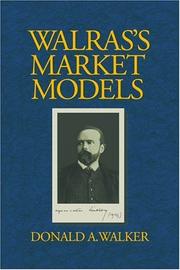
ISBN: 0521562686 0521022959 0511664508 Year: 1996 Publisher: Cambridge : Cambridge University Press,
Abstract | Keywords | Export | Availability | Bookmark
 Loading...
Loading...Choose an application
- Reference Manager
- EndNote
- RefWorks (Direct export to RefWorks)
Walras's Market Models describes and evaluates Léon Walras's models of competitive markets. Through identification of his career phases and the associated general equilibrium models, which are shown to be very different in character, this book differs from previous examinations of his work. During his mature phase of theoretical activity, Walras was concerned with a competitive economy which passes through a phase of disequilibrium in the production and sales of commodities. While in his last phase of theoretical activity, he developed a model in which there is no production, sales, hiring, consuming or saving until an assumed set of equilibrium prices obtains of the model. The two phases of Walras's theoretical work have not previously been identified, and the models have not been subjected to an accurate analysis and evaluation.
Walras, Léon --- Business, Economy and Management --- Economics --- Commodity exchanges --- Commercial products --- Equilibrium (Economics) --- Mathematical models. --- Walras, Léon, --- Commodities --- Economic goods --- Merchandise --- Products, Commercial --- Manufactures --- Substitute products --- Commodities exchange --- Commodity markets --- Exchanges, Commodity --- Exchanges, Produce --- Produce exchanges --- Futures market --- Produce trade --- Speculation --- Contracting out --- Walras, Marie Esprit Léon,
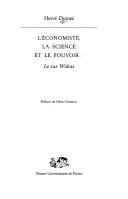
ISBN: 2130390951 9782130390954 Year: 1985 Publisher: Paris Presses Universitaires de France
Abstract | Keywords | Export | Availability | Bookmark
 Loading...
Loading...Choose an application
- Reference Manager
- EndNote
- RefWorks (Direct export to RefWorks)
Sociology of knowledge --- Economic schools --- Political sociology --- Walras, Léon --- Economists --- Economistes --- Biography --- Biographie --- Walras, Léon, --- AA / International- internationaal --- 08 --- 330.00 --- 330.08 --- Biografieën en memoires. --- Economische en sociale theorieën: algemeenheden. --- Economisten. --- Walras, Marie Esprit Léon, --- Walras, Léon, --- Biografieën en memoires --- Economische en sociale theorieën: algemeenheden --- Economisten --- Economists - France - Biography --- Walras, Léon, - 1834-1910
Book
ISBN: 1852784881 9781852784881 Year: 1992 Volume: 25 Publisher: Aldershot Edward Elgar
Abstract | Keywords | Export | Availability | Bookmark
 Loading...
Loading...Choose an application
- Reference Manager
- EndNote
- RefWorks (Direct export to RefWorks)
Walras, Léon --- Equilibre (Economie politique) --- Walras, Léon, --- Walras, Leon, --- 08 --- Biografieën en memoires. --- Walras, Léon, --- Equilibrium (Economics) --- AA / International- internationaal --- DGE (Economics) --- Disequilibrium (Economics) --- DSGE (Economics) --- Dynamic stochastic general equilibrium (Economics) --- Economic equilibrium --- General equilibrium (Economics) --- Partial equilibrium (Economics) --- SDGE (Economic theory) --- Economics --- Statics and dynamics (Social sciences) --- Biografieën en memoires --- Walras, Marie Esprit Léon, --- Walras, Léon, - 1834-1910
Book
ISBN: 9780415594646 9780203816110 9780415746267 9781136719820 9781136719776 9781136719813 0415746264 0203816110 0415594642 1136719814 1283442108 9786613442109 1136719822 Year: 2011 Publisher: Abingdon, Oxon : Routledge,
Abstract | Keywords | Export | Availability | Bookmark
 Loading...
Loading...Choose an application
- Reference Manager
- EndNote
- RefWorks (Direct export to RefWorks)
2010 marks the hundredth anniversary of the death of Léon Walras, the brilliant originator and first formaliser of general equilibrium theory - one of the pillars of modern economic theory. In advancing much derided practical solutions Walras also displayed more concern for the problems of living in a second best world than is common in modern pure theories of the invisible hand, efficient market hypothesis, DSGE macroeconomics or the thinking of some contemporary free market admirers all based on general equilibrium theory.This book brings contributions from the likes of Kenn
Economic schools --- Walras, Léon --- Equilibrium (Economics) --- Walras, Léon, --- AA / International- internationaal --- 330.01 --- 339.5 --- Disequilibrium (Economics) --- Economic equilibrium --- General equilibrium (Economics) --- Partial equilibrium (Economics) --- Economics --- Stagnation (Economics) --- Statics and dynamics (Social sciences) --- Theorie van het economisch evenwicht. --- Walras, Marie Esprit Léon, --- DGE (Economics) --- DSGE (Economics) --- Dynamic stochastic general equilibrium (Economics) --- SDGE (Economic theory) --- Theorie van het economisch evenwicht --- Walras, Léon, --- Walras, Léon, - 1834-1910
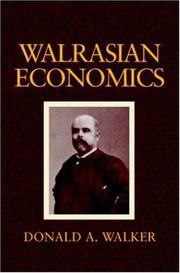
ISBN: 0521858550 9780521858557 9780511510748 9780521394086 0511161859 9780511161858 0511159390 9780511159398 0511510748 0511160550 9780511160554 0511161123 9780511161124 1107156165 1280414413 051116131X 051131325X 0521394082 Year: 2006 Publisher: Cambridge : Cambridge University Press,
Abstract | Keywords | Export | Availability | Bookmark
 Loading...
Loading...Choose an application
- Reference Manager
- EndNote
- RefWorks (Direct export to RefWorks)
In order to understand the various strands of general equilibrium theory, why it has taken the forms that it has since the time of Léon Walras, and to appreciate fully a view of the state of general equilibrium theorising, it is essential to understand Walras's work and examine its influence. The first section of this 2006 book accordingly examines the foundations of Walras's work. These include his philosophical and methodological approach to economic modelling, his views on human nature, and the basic components of his general equilibrium models. The second section examines how the influence of his ideas has been manifested in the theorising of his successors, surveying the models of theorists such as H. L. Moore, Vilfredo Pareto, Knut Wicksell, Gustav Cassel, Abraham Wald, John von Neumann, J. R. Hicks, Kenneth Arrow, and Gerard Debreu. The treatment also examines models of many types in which Walras's influence is explicitly acknowledged.
Walras, Léon --- Equilibrium (Economics) --- Economics --- FR / France - Frankrijk --- 330.08 --- Economisten. --- DGE (Economics) --- Disequilibrium (Economics) --- DSGE (Economics) --- Dynamic stochastic general equilibrium (Economics) --- Economic equilibrium --- General equilibrium (Economics) --- Partial equilibrium (Economics) --- SDGE (Economic theory) --- Statics and dynamics (Social sciences) --- Economic theory --- Political economy --- Social sciences --- Economic man --- Economisten --- Walras, Léon, --- Walras, Marie Esprit Léon, --- Walras, Léon, --- Economics. --- Business, Economy and Management --- Walras, Léon, - 1834-1910
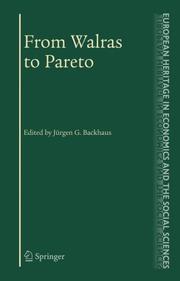
ISBN: 1280724390 9786610724390 0387337571 0387337563 1441941479 Year: 2006 Publisher: New York, NY : Springer US : Imprint: Springer,
Abstract | Keywords | Export | Availability | Bookmark
 Loading...
Loading...Choose an application
- Reference Manager
- EndNote
- RefWorks (Direct export to RefWorks)
One may have various reasons for compiling a volume of papers devoted to and inspired by Walras and Pareto. Pareto succeeded Walras in 1893 on the chair of Political Economy at the University of Lausanne. The relation between the two was not always without tensions, although Pareto, on the occasion of his 25 years jubilee celebration, at least in part, transferred the honours offered to him to Walras. Indeed, one may say that to a substantial extent important parts of the works of Pareto would not have been possible without the insights of Walras. Both eminent scientists also have in common that the image of their inheritance professed to the common university trained economic scholars ('cutes') is a highly restricted caricature of the fullnes of their essential insights and contributions, and students of sociology or politicology may even finish their academic studies without ever having heard the name of Pareto. What cutes "know" about Walras amounts to the following caricature. Walras developed the general economic equilibrium model, but did not care about uniqueness and stability of an equilibrium. It is a model with exchange and production only and it assumes an auctioneer who announces price vectors to establish the equilibrium. The model presupposes perfect information and is static and certainly not dynamic. Walras had a bias towards free competition and laisser faire and neglected monopoly and taxation. Pareto is known by the cutes as the founding father of welfare economics. At best one is informed the notions of Pareto-optimality conditions and the first and second welfare theorems. But welfare economics is in general disappearing from the university research and teaching programs, replaced as it is by consumer and producer surpluses in the nowadays flourishing partial industrial economics programs. In this thought-provoking collection, ten international scholars offer reflections and new interpretations of Walras’and Pareto’s unique contributions to topics as broad as the over-arching important of the social sciences, the development of modern microeconomics and (in particular) econometrics, political economy and public choice, and political sociology. Their insights will be of particular interest to researchers and scholars of economic history, political sociology, and the social sciences.
Equilibrium (Economics) --- Welfare economics. --- Walras, Léon, --- Pareto, Vilfredo, --- Economic policy --- Economics --- Social policy --- DGE (Economics) --- Disequilibrium (Economics) --- DSGE (Economics) --- Dynamic stochastic general equilibrium (Economics) --- Economic equilibrium --- General equilibrium (Economics) --- Partial equilibrium (Economics) --- SDGE (Economic theory) --- Statics and dynamics (Social sciences) --- Walras, Marie Esprit Léon, --- Economics. --- Macroeconomics. --- Economic history. --- Economics, general. --- Macroeconomics/Monetary Economics//Financial Economics. --- History of Economic Thought/Methodology. --- Economic conditions --- History, Economic --- Economic theory --- Political economy --- Social sciences --- Economic man --- Management science. --- Quantitative business analysis --- Management --- Problem solving --- Operations research --- Statistical decision
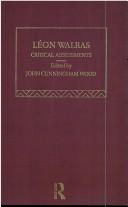
ISBN: 0415074827 0415074835 0415074843 0415074851 9780415074841 9780415074858 9780415074827 9780415074834 Year: 1993 Publisher: London Routledge
Abstract | Keywords | Export | Availability | Bookmark
 Loading...
Loading...Choose an application
- Reference Manager
- EndNote
- RefWorks (Direct export to RefWorks)
Walras, Léon --- AA / International- internationaal --- 08 --- 330.46 --- 012 --- 330.45 --- NBB multivolumes --- Biografieën en memoires. --- Hedendaagse periode, met inbegrip van de psychologische school (Oostenrijkse), mathematische school, solidarisme, communisme, marxisme, bolsjewisme, anarchisme. --- Individuele bibliografieën van auteurs --- Socialisten en interventionisten, christelijke sociale figuren kenmerkend voor de XIXe eeuw. --- Walras, Léon, --- Biografieën en memoires --- Socialisten en interventionisten, christelijke sociale figuren kenmerkend voor de XIXe eeuw --- Hedendaagse periode, met inbegrip van de psychologische school (Oostenrijkse), mathematische school, solidarisme, communisme, marxisme, bolsjewisme, anarchisme --- Walras, Léon, --- Walras, Marie Esprit Léon, --- Walras, Léon, - 1834-1910
| Listing 1 - 10 of 14 | << page >> |
Sort by
|

 Search
Search Feedback
Feedback About
About Help
Help News
News